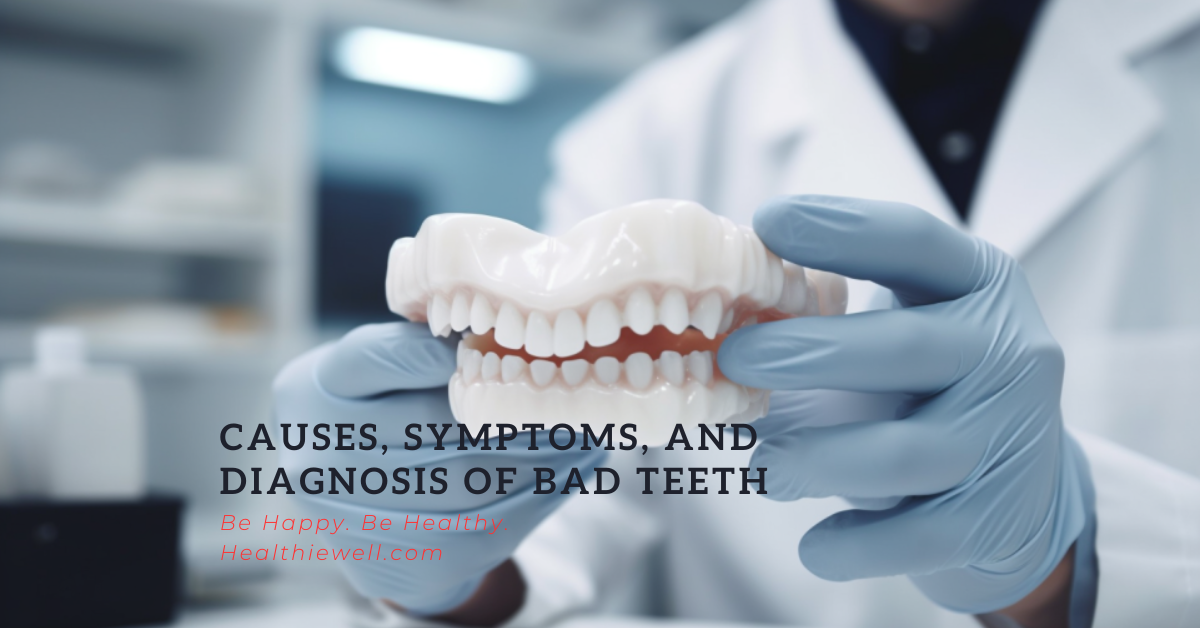Bad teeth, also known as dental caries or cavities, are a common problem in the United States. According to the Centers for Disease Control and Prevention (CDC), approximately 91% of adults aged 20-64 have at least one cavity, while 27% of adults have untreated tooth decay. The prevalence of dental caries is higher in specific populations, such as children, low-income individuals, and those living in rural areas. In this blog post, we will discuss the causes, symptoms, and diagnosis of bad teeth in the United States.
Read more : Why are bodyweight exercises harder than weights?
Causes of Bad Teeth
Dental caries is caused by a combination of factors, including bacteria in the mouth, sugary or starchy foods, and poor oral hygiene. When bacteria in the mouth break down food particles, they produce acid that can erode the enamel on teeth, leading to cavities. Frequent snacking or sipping on sugary drinks can create an acidic environment in the mouth, making teeth more susceptible to decay. Poor oral hygiene, such as infrequent brushing or flossing, can also contribute to the development of dental caries.
Certain factors can increase an individual’s risk of developing bad teeth, including:
- Poor nutrition: A diet that is high in sugar, carbohydrates, and processed foods can increase the risk of dental caries.
- Dry mouth: Saliva helps neutralize the acid in the mouth and wash away food particles, so a dry mouth can increase the risk of cavities.
- Medical conditions: Certain medical conditions, such as acid reflux or eating disorders, can increase the risk of dental caries.
- Medications: Some medications, such as antihistamines or antidepressants, can cause dry mouth, which can increase the risk of dental caries.
- Age: As we age, the enamel on our teeth can wear down, making them more vulnerable to decay.
- Genetics: Some individuals may be more prone to dental caries due to their genetic makeup.
Read more : Developing grip strength with sweaty hands when doing pull-ups
Symptoms of Bad Teeth
The symptoms of dental caries can vary depending on the severity of the cavity. In the early stages, a cavity may not cause any symptoms. As the cavity progresses, the following symptoms may occur:
- Tooth sensitivity: The affected tooth may be sensitive to hot, cold, or sweet foods and drinks.
- Toothache: The affected tooth may ache or throb, especially when biting down or applying pressure.
- Visible hole or pit in the tooth: As the cavity grows, a visible hole or pit may develop in the affected tooth.
- Discoloration: The affected tooth may appear dark or discolored.
- Bad breath: Bacteria in the mouth can produce a foul odor, leading to bad breath.
Diagnosis of Bad Teeth
A dentist can diagnose dental caries through a visual examination of the teeth and X-rays. During the exam, the dentist will look for signs of cavities, such as visible holes or discoloration. X-rays can help detect cavities that may not be visible during the visual exam.
If a cavity is detected, the dentist will determine the severity of the cavity and develop a treatment plan. Treatment options may include:
Dental fillings: For small cavities, the dentist may be able to fill the cavity with a tooth-colored resin or amalgam filling.
Read more : Why Are My Teeth Yellow? Causes and Solutions
Dental crowns: For larger cavities, a dental crown may be necessary to protect the tooth and restore its function.
Root canal: If the cavity has reached the pulp of the tooth, a root canal may be necessary to remove the infected tissue and save the tooth.
Tooth extraction: In severe cases, the tooth may need to be extracted.
Prevention of Bad Teeth
Preventing dental caries is possible through good oral hygiene and healthy habits, including:
- Brushing twice a day: Brushing your teeth twice a day with fluoride toothpaste can help remove food particles and plaque that can lead to cavities.
- Flossing daily: Flossing can help remove food particles and plaque from between teeth and along the gumline.
- Limiting sugary and starchy foods: Eating a diet that is low in sugar and starch can help reduce the risk of dental caries.
- Drinking water: Drinking water can help rinse away food particles and neutralize the acid in the mouth.
- Chewing sugarless gum: Chewing sugarless gum can help stimulate saliva production, which can help neutralize the acid in the mouth.
- Regular dental check-ups: Regular dental check-ups can help detect cavities early and prevent them from progressing.
Read more : Stopping the Bleeding: Effective Treatment for Healthy Gums
In conclusion, dental caries or bad teeth are a common problem. It is caused by a combination of factors, including bacteria in the mouth, sugary or starchy foods, and poor oral hygiene. The symptoms of bad teeth can include tooth sensitivity, toothache, visible holes or pits in the teeth, discoloration, and bad breath. A dentist can diagnose dental caries through a visual exam and X-rays and develop a treatment plan based on the severity of the cavity. Prevention of dental caries is possible through good oral hygiene and healthy habits, including brushing twice a day, flossing daily, limiting sugary and starchy foods, drinking water, chewing sugarless gum, and having regular dental check-ups. By following these tips, you can reduce your risk of developing bad teeth and maintain good oral health.

